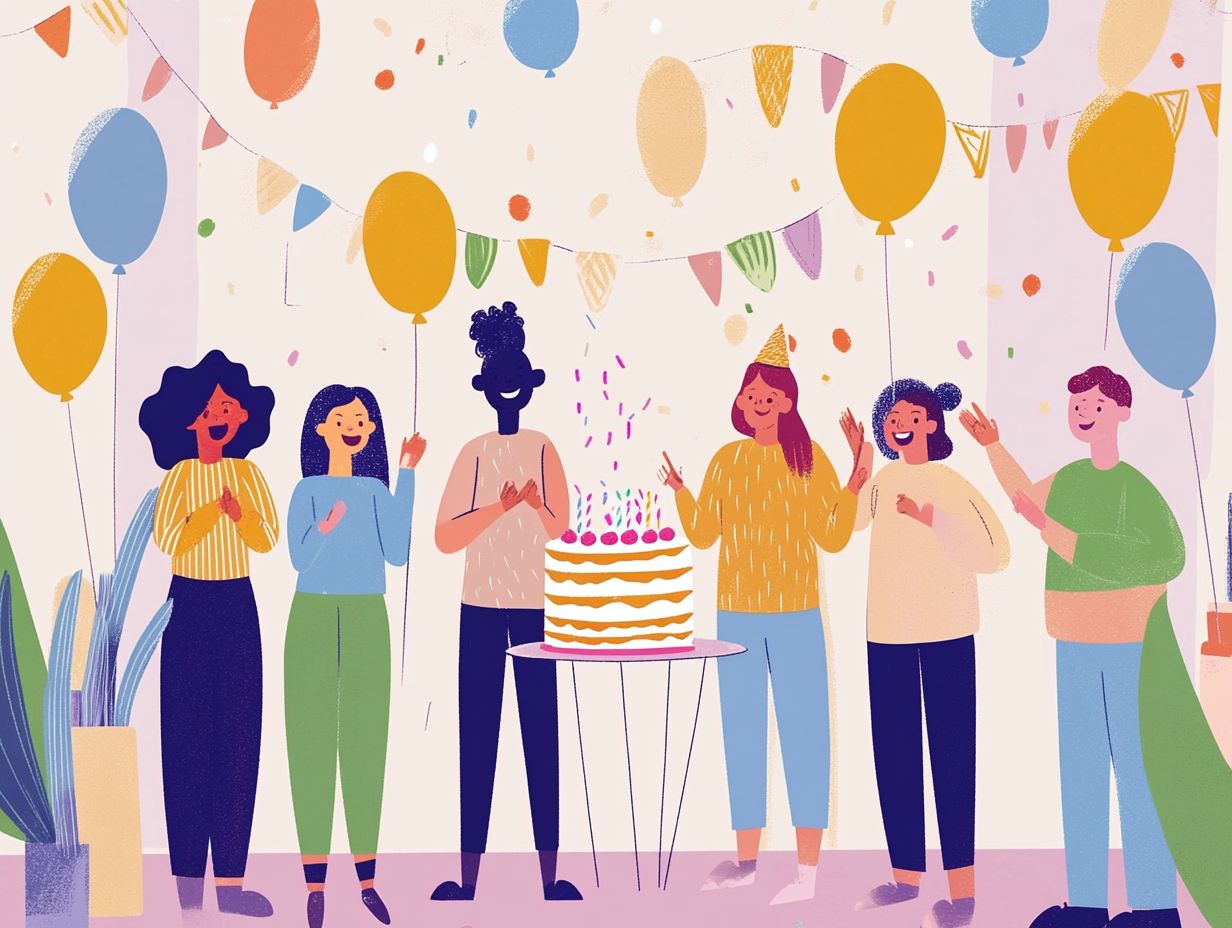Celebrating milestones during treatment is essential for acknowledging progress, boosting motivation, and reinforcing commitment to recovery. Recognizing achievements along the recovery journey fosters a sense of accomplishment and strengthens emotional resilience.
Here are 10 ways to celebrate milestones during treatment:
- Plan a Special Outing or Activity: Engage in enjoyable activities like hiking, kayaking, or attending community events to create positive memories. Consider going on an adventure to explore new places.
- Have a Small Celebration with Family and Friends: Organize intimate gatherings to acknowledge achievements and strengthen bonds. You could even throw a recovery party to celebrate your recovery journey.
- Treat Yourself to Something You’ve Been Wanting: Reward yourself with a favorite dessert, a spa day, or a new experience to celebrate personal progress.
- Reflect on Your Progress and Accomplishments: Take time to recognize your growth through journaling or personal reflection. A recovery journal can be an excellent way to track your progress and reflect on personal accomplishments.
- Create a Memory Book or Scrapbook: Document your journey with photographs, letters, and keepsakes.
- Write a Letter to Your Future Self: Articulate your hopes and goals, and track your progress over time. This helps in visualizing positive changes and significant achievements.
- Volunteer or Give Back to Others: Enhance your connection to the recovery community through acts of service.
- Have a Spa Day or Pamper Yourself: Reduce stress and promote relaxation with self-care activities.
- Try Something New or Challenging: Foster personal growth by exploring new hobbies or sports.
- Practice Gratitude and Celebrate the Small Wins: Acknowledge and share your progress to improve mood and overall fulfillment.
These celebrations provide positive reinforcement, helping individuals feel supported and connected to their recovery journey. By incorporating these practices, you can enhance your well-being and stay motivated on the path to recovery.
Key Takeaways:
1. Plan a Special Outing or Activity

Planning a special outing or activity supports the recovery journey by creating positive memories and reinforcing progress.
Activities like hiking or kayaking encourage physical activity and improve health.
Attending community events fosters connections with others in recovery, enhancing understanding and camaraderie.
Family gatherings, such as picnics or dinners, strengthen bonds and promote open communication about recovery.
These outings emphasize that recovery is a communal journey best experienced together.
|||
Planning a special outing or activity supports the recovery journey by creating positive memories and reinforcing progress.
Activities like hiking or kayaking encourage physical activity and improve health.
Attending community events fosters connections with others in recovery, enhancing understanding and camaraderie.
Family gatherings, such as picnics or dinners, strengthen bonds and promote open communication about recovery.
These outings emphasize that recovery is a communal journey best experienced together. Consider using external resources to plan these outings for the best experience.
Planning a special outing or activity supports the recovery journey by creating positive memories and reinforcing progress.
Activities like hiking or kayaking encourage physical activity and improve health.
Attending community events fosters connections with others in recovery, enhancing understanding and camaraderie.
Family gatherings, such as picnics or dinners, strengthen bonds and promote open communication about recovery.
These outings emphasize that recovery is a communal journey best experienced together.
2. Have a Small Celebration with Family and Friends
Organize a small celebration with family and friends to celebrate recovery milestones.
Celebrations can include a dinner at home or a picnic in the park, providing a supportive environment to acknowledge achievements.
These gatherings strengthen bonds and boost emotional well-being.
3. Treat Yourself to Something You’ve Been Wanting
Treating yourself to something you’ve been wanting recognizes progress in recovery and celebrates personal achievements.
Activities like enjoying a favorite dessert or a spa day can boost well-being and motivation.
Exploring new experiences enhances self-worth and fosters personal growth.
4. Reflect on Your Progress and Accomplishments
Reflecting on progress and accomplishments helps individuals recognize their growth and plan for future improvements.
This practice enhances self-awareness and motivation by acknowledging recovery milestones and celebrating achievements.
Regular journaling can capture these reflections and contribute to a strong sense of personal resilience.
5. Create a Memory Book or Scrapbook
Creating a memory book or scrapbook involves compiling photographs, letters, and personal keepsakes to document significant experiences and achievements.
This process helps capture and reflect on personal journeys and milestones.
A memory book can include items such as:
- Ticket stubs
- Notes
- Journal entries
These items serve as both a visual narrative and motivational tool.
6. Write a Letter to Your Future Self

Writing a letter to your future self involves articulating hopes, goals, and accomplishments to achieve in a recovery journey.
This exercise helps visualize aspirations, enhances self-awareness, and keeps track of progress.
Using prompts like “What do I hope to accomplish in a year?” can structure the letter and deepen journey exploration.
7. Volunteer or Give Back to Others
Volunteering or giving back enhances connection to the recovery community and supports personal healing.
Participating in community service, such as helping at shelters, mentoring, or clean-up events, builds resilience and a support network.
By sharing recovery journeys, individuals inspire hope and strengthen mutual recovery.
8. Have a Spa Day or Pamper Yourself
Having a spa day or pampering yourself can improve mental health during recovery by reducing stress and promoting relaxation.
Activities like warm baths with essential oils, guided meditation, and light yoga enhance emotional well-being and relaxation.
Self-care activities provide immediate relief and reinforce the importance of self-love and personal growth.
9. Try Something New or Challenging
Trying something new or challenging enhances recovery by fostering personal growth and positive change.
Engaging in activities like new hobbies or sports can improve mental well-being and build resilience.
These experiences introduce novelty, encourage creativity, and offer opportunities for social connection.
Achieving new goals creates a sense of accomplishment and reinforces a positive outlook on the recovery journey.
10. Practice Gratitude and Celebrate the Small Wins
Practicing gratitude and celebrating small wins are important for mental health and recovery.
Gratitude can be practiced by journaling, reflecting on positive experiences, and acknowledging progress.
Sharing small wins fosters a sense of belonging and encouragement within the recovery community.
This practice improves mood, reduces anxiety, and enhances overall fulfillment.
Why Is It Important to Celebrate Milestones During Treatment?

Celebrating milestones during treatment is important because it acknowledges progress and boosts motivation for continued recovery.
Milestone celebrations provide positive reinforcement, helping individuals feel supported and connected to their recovery journey.
These celebrations strengthen emotional resilience and reinforce commitment to healing.
What Are Some Other Ways to Celebrate Milestones?
Ways to celebrate recovery milestones include:
- Organizing a gathering with friends
- Participating in local charity events
- Engaging in reflective journaling
Celebrating milestones through these activities can strengthen support networks and emphasize personal growth.
How Can Celebrating Milestones Help with Recovery?
Celebrating milestones helps with recovery by acknowledging progress, boosting self-esteem, and fostering community connections.
Milestones provide tangible recognition of achievements, reinforcing commitment to recovery.
Sharing successes within a community strengthens bonds and enhances overall well-being.
What Are Some Tips for Planning a Milestone Celebration?
Some tips for planning a milestone celebration include:
- Choose a venue that is meaningful, such as a significant location in your journey.
- Invite guests who played key roles in your achievements, including friends, family, and mentors.
- Add personal touches like photos, stories, or speeches to reflect your journey and achievements.
How Can Loved Ones Support Someone Celebrating a Milestone in Treatment?
Loved ones can support someone celebrating a milestone in treatment by acknowledging achievements and participating in celebrations.
Planning gatherings, surprise parties, or virtual celebrations can create memorable moments.
Providing emotional support through listening, encouragement, and presence can elevate the individual’s spirit.
These actions bolster the sense of accomplishment and contribute to improved mental health.
What Are Some Common Milestones in Recovery and How Can They Be Celebrated?

Common recovery milestones include achieving sobriety, attending support groups, completing treatment programs, and reaching significant sobriety anniversaries.
Celebrating these milestones can involve:
- Hosting gatherings
- Participating in community recovery events
- Sharing successes with supportive friends and family
These celebrations reinforce personal achievements and foster community connections.
Frequently Asked Questions
What are 10 ways to celebrate milestones during treatment?
1. Plan a special outing or activity with loved ones to mark the occasion, perhaps even go on an adventure or try something new.
2. Treat yourself to a relaxing spa day or massage.
3. Create a scrapbook or journal to document your recovery journey and reflect on your progress.
4. Have a celebratory dinner or cook a special meal at home.
5. Take a day trip to a nearby city or nature spot for some forest-bathing.
6. Attend a support group meeting, such as Alcoholics Anonymous or Narcotics Anonymous, and share your achievements with others in the recovery community.
7. Buy yourself a meaningful piece of jewelry or item to commemorate the milestone and celebrate your recovery.
8. Have a movie marathon and indulge in your favorite films.
9. Write a letter to your future self, reflecting on how far you’ve come and the positive changes in your mental health.
10. Make a donation to a charity, give back to the community, or volunteer time with an organization that is important to you, such as those that help others struggling with substance abuse or mental health issues.
Why is it important to celebrate milestones during treatment?
Celebrating milestones, such as during National Recovery Month, can provide a sense of accomplishment and motivation to continue on your recovery journey. It also allows for reflection and recognition of your progress, which can boost self-esteem and build resilience, enhancing your mental well-being.
How often should I celebrate milestones during treatment?
This can vary for each individual, but it is important to set realistic and attainable goals. Depending on the length of treatment, milestones can be celebrated every few weeks or months. Remember to celebrate small victories as well as significant achievements.
What if I don’t feel like celebrating a milestone?
It is completely normal to have ups and downs during treatment, and there may be times when you don’t feel like celebrating. It’s okay to take a break and acknowledge the milestone in your own way, perhaps through journal writing or reflecting on personal accomplishments, or choose to celebrate at a later time.
Can I celebrate milestones by myself or do I need others?
Celebrating milestones can be done alone or with others, depending on your preference. Some people may find it empowering to celebrate alone, while others may want to share their achievements with loved ones or their support network for encouragement. You could even throw a recovery party or spend quality time with those who support your therapeutic affiliation.
What if I experience setbacks during treatment?
Setbacks are a natural part of any journey, and it’s important to remember that they do not diminish the progress you have made. Instead of dwelling on setbacks, use them as motivation to keep moving forward and celebrate your recovery milestones even more triumphantly. Consider exploring creative ways to overcome challenges, such as engaging in equine therapy, crisis response, or using external resources like the Substance Abuse and Mental Health Services Administration or the National Institute on Drug Abuse.








